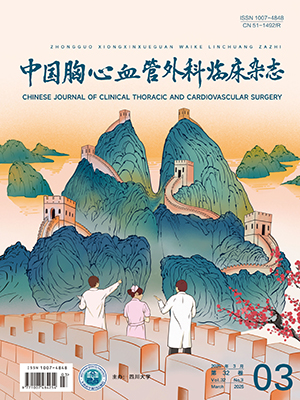| 1. |
Asgar AW, Mack MJ, Stone GW. Secondary mitral regurgitation in heart failure: Pathophysiology, prognosis, and therapeutic considerations. J Am Coll Cardiol, 2015, 65(12): 1231-1248.
|
| 2. |
Bertrand PB, Schwammenthal E, Levine RA, et al. Exercise dynamics in secondary mitral regurgitation: Pathophysiology and therapeutic implications. Circulation, 2017, 135(3): 297-314.
|
| 3. |
Bursi F, Enriquez-Sarano M, Nkomo VT, et al. Heart failure and death after myocardial infarction in the community: The emerging role of mitral regurgitation. Circulation, 2005, 111(3): 295-301.
|
| 4. |
Grigioni F, Enriquez-Sarano M, Zehr KJ, et al. Ischemic mitral regurgitation: Long-term outcome and prognostic implications with quantitative Doppler assessment. Circulation, 2001, 103(13): 1759-1764.
|
| 5. |
Grigioni F, Detaint D, Avierinos JF, et al. Contribution of ischemic mitral regurgitation to congestive heart failure after myocardial infarction. J Am Coll Cardiol, 2005, 45(2): 260-267.
|
| 6. |
Blondheim DS, Jacobs LE, Kotler MN, et al. Dilated cardiomyopathy with mitral regurgitation: Decreased survival despite a low frequency of left ventricular thrombus. Am Heart J, 1991, 122(3 Pt 1): 763-771.
|
| 7. |
Agricola E, Ielasi A, Oppizzi M, et al. Long-term prognosis of medically treated patients with functional mitral regurgitation and left ventricular dysfunction. Eur J Heart Fail, 2009, 11(6): 581-587.
|
| 8. |
Goldstein D, Moskowitz AJ, Gelijns AC, et al. Two-year outcomes of surgical treatment of severe ischemic mitral regurgitation. N Engl J Med, 2016, 374(4): 344-353.
|
| 9. |
Lancellotti P, Pellikka PA, Budts W, et al. The clinical use of stress echocardiography in non-ischaemic heart disease: Recommendations from the European Association of Cardiovascular Imaging and the American Society of Echocardiography. Eur Heart J Cardiovasc Imaging, 2016, 17(11): 1191-1229.
|
| 10. |
Agarwal MA, Fonarow GC, Ziaeian B. National trends in heart failure hospitalizations and readmissions from 2010 to 2017. JAMA Cardiol, 2021, 6(8): 952-956.
|
| 11. |
Koelling TM, Aaronson KD, Cody RJ, et al. Prognostic significance of mitral regurgitation and tricuspid regurgitation in patients with left ventricular systolic dysfunction. Am Heart J, 2002, 144(3): 524-529.
|
| 12. |
Rossi A, Dini FL, Faggiano P, et al. Independent prognostic value of functional mitral regurgitation in patients with heart failure. A quantitative analysis of 1256 patients with ischaemic and non-ischaemic dilated cardiomyopathy. Heart, 2011, 97(20): 1675-1680.
|
| 13. |
Sannino A, Smith RL, Schiattarella GG, et al. Survival and cardiovascular outcomes of patients with secondary mitral regurgitation: A systematic review and meta-analysis. JAMA Cardiol, 2017, 2(10): 1130-1139.
|
| 14. |
Goliasch G, Bartko PE, Pavo N, et al. Refining the prognostic impact of functional mitral regurgitation in chronic heart failure. Eur Heart J, 2018, 39(1): 39-46.
|
| 15. |
Acker MA, Jessup M, Bolling SF, et al. Mitral valve repair in heart failure: Five-year follow-up from the mitral valve replacement stratum of the Acorn randomized trial. J Thorac Cardiovasc Surg, 2011, 142(3): 569-574.
|
| 16. |
Deja MA, Grayburn PA, Sun B, et al. Influence of mitral regurgitation repair on survival in the surgical treatment for ischemic heart failure trial. Circulation, 2012, 125(21): 2639-2648.
|
| 17. |
朱丹, 王哲, 陈安清, 等. 缺血性心肌病非移植外科治疗远期效果. 中华胸心血管外科杂志, 2010, (26): 224-226.
|
| 18. |
Vahanian A, Beyersdorf F, Praz F, et al. 2021 ESC/EACTS guidelines for the management of valvular heart disease. Eur Heart J, 2022, 43(7): 561-632.
|
| 19. |
Chung H, Amaki M, Takashio S, et al. Effect of mitral valve surgery in patients with dilated cardiomyopathy and severe functional mitral regurgitation. Circ J, 2017, 82(1): 131-140.
|
| 20. |
Stone GW, Lindenfeld J, Abraham WT, et al. Transcatheter mitral-valve repair in patients with heart failure. N Engl J Med, 2018, 379(24): 2307-2318.
|
| 21. |
Paraskevaidis IA, Adamopoulos S, Kremastinos DT. Dobutamine echocardiographic study in patients with nonischemic dilated cardiomyopathy and prognostically borderline values of peak exercise oxygen consumption: 18-month follow-up study. J Am Coll Cardiol, 2001, 37(6): 1685-1691.
|
| 22. |
Scrutinio D, Napoli V, Passantino A, et al. Low-dose dobutamine responsiveness in idiopathic dilated cardiomyopathy: Relation to exercise capacity and clinical outcome. Eur Heart J, 2000, 21(11): 927-934.
|
| 23. |
Cifra B, Dragulescu A, Brun H, et al. Left ventricular myocardial response to exercise in children after heart transplant. J Heart Lung Transplant, 2014, 33(12): 1241-1247.
|
| 24. |
Sebbag L, Bergerot C, Jamal F, et al. Alteration of the left ventricular contractile reserve in heart transplant patients: A dobutamine stress strain rate imaging study. Transplant Proc, 2003, 35(8): 3072-3074.
|
| 25. |
Nagueh SF, Mikati I, Weilbaecher D, et al. Relation of the contractile reserve of hibernating myocardium to myocardial structure in humans. Circulation, 1999, 100(5): 490-496.
|
| 26. |
Wu AH, Aaronson KD, Bolling SF, et al. Impact of mitral valve annuloplasty on mortality risk in patients with mitral regurgitation and left ventricular systolic dysfunction. J Am Coll Cardiol, 2005, 45(3): 381-387.
|




